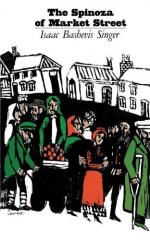|
This section contains 2,014 words (approx. 6 pages at 400 words per page) |

|
Brent has a Ph.D. in American culture, specializing in cinema studies, from the University of Michigan. She is a freelance writer and teaches courses in American cinema. In the following essay, Brent discusses the Jewish theological texts referred to in this story.
Critic Lawrence Alexander has pointed out that Isaac Bashevis Singer "almost always writes as a Jew, to Jews, for Jews: and yet he is heard by everybody." Other critics have concurred that it is through Singer's very specific focus on the vanished world of Chassidic Jewry in the shtetls (small Eastern European Jewish communities) of Warsaw, Poland, before World War II, the world of his childhood and young adulthood, that Singer's fiction draws its universal appeal. Furthermore, critics generally agree that it is through the skillful translations of Singer's Yiddish stories into English that they successfully maintain the power of his own native language...
|
This section contains 2,014 words (approx. 6 pages at 400 words per page) |

|




